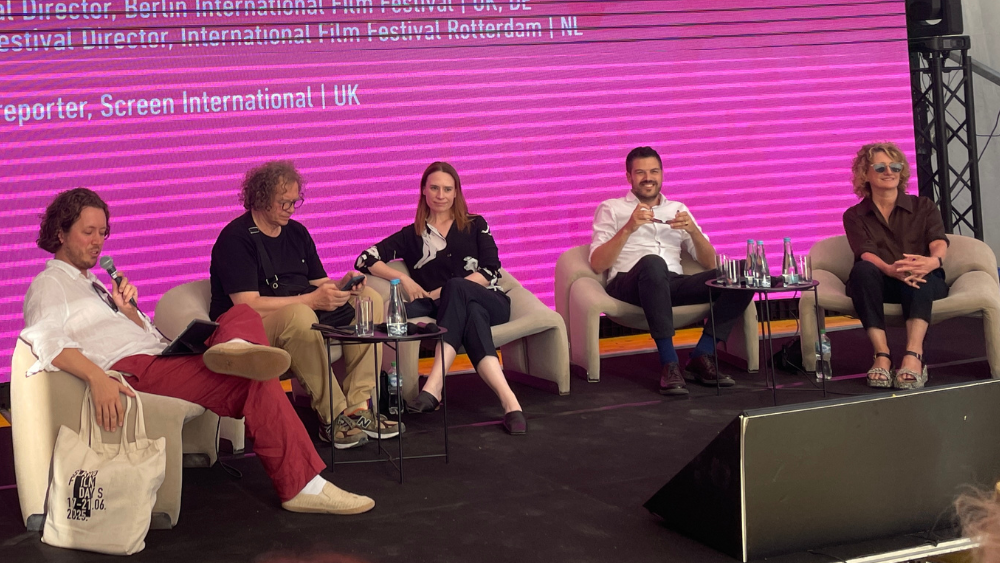The heads of some of the world’s leading film fetes gathered Tuesday at the Sarajevo Film Festival to discuss the role of festivals, broaching topical issues such as audience development and how growing political tension is affecting both curatorial and strategic decisions.
When asked about a festival’s responsibility of showing “uncomfortable and divisive films,” festival director of the Berlin Film Festival Tricia Tuttle said, “absolutely.” “Part of our role is to find and back voices that sometimes make people uncomfortable. That is one of the things festivals can do.”
“We are not just idea factories,” she continued. “Cinemas and festivals have always been spaces where you can start difficult conversations. What I really, really love about what filmmakers can do for these difficult conversations is show us something so much more complex than what a news piece can do. There is something that happens between language that is so powerful. We have to show uncomfortable films. Definitely.”
Sarajevo head Jovan Marjanović echoed Tuttle: “It’s important to make the distinction that festivals are not your source of news. It’s a way to get a broader picture and reflect. If we communicate that, we will reduce the amount of tension created by social media and sometimes fake news. If you understand festivals as places to communicate, I think we will be more successful in doing what we’re supposed to do. The last two years have become overly politicized. Festivals should be political; we have brought it upon ourselves, but we need to calm down a little. It is hard, but it’s manageable.”
Tuttle added that she and the Berlinale team had a type of moderation training course last year developed by the festival’s chief of staff, Florian Weghorn. “They were great sessions to give people more confidence in contested spaces. It wasn’t ever to stop any conversation, but to recognize that people sometimes feel hurt by things that get said in an audience. [Those sessions] didn’t give us the answers, but they gave people the confidence to be able to go into a very, very difficult film festival for us last year, and I definitely want to keep doing that.”
Rotterdam’s Vanja Kaluđerčić held something similar at the Dutch festival, saying the growing political tensions have made the team “much more aware of how to work with front of house and moderators” in “politically-charged environments.”
“We have a town hall meeting where everything is discussed with team members, freelancers, and the whole team. If we recognize there is a bigger dilemma, a bigger criticism within the team, or a desire to learn more about something, we respond to that. We organize debates where people can express their opinions, no matter how contrasting they are to each other. We are willing to learn and still continue to be a team.”
The panellists also discussed the role of festivals within the distribution and exhibition ecosystem. Festivals are still largely responsible for the circulation of arthouse, experimental, and auteur-driven films, but Tuttle emphasized that the industry is “worried about the growing chasm between festivals and cinemagoing.”
“One of our most important roles is to continue to show films people can’t see in other places and continue to build an appetite and knowledge in audiences for different cinema forms,” she added. “But we have to figure out how to gain more visibility, and that’s through probably working together more than we do now, but also figuring out how to communicate with audiences through social media, specifically younger audiences between 18-30.”
To that point, the Berlinale head spoke about a lack of visibility not only through an increasingly tougher theatrical distribution market but also the shrinking of specialized press. “We’ve been talking about this for 20 years, the diminishing inches for writing about film that are not celebrity-based or news and agenda-based. This has all but disappeared now, and I think as critical as screen space is visibility and making sure audiences are aware of films.”
“I think if any of us who are lucky to live in countries with public funding need to lobby hard for investment, maybe even less investment in production and more investment in exhibition and distribution, because that’s where the biggest problem is,” added Tuttle. “If you don’t have screens for the Golden Bear winner, that was just released recently in the U.K. to an alarmingly few number of screens, then how are audiences going to find that film? This intervention is something absolutely essential globally.”
Still, the panel wrapped on a positive note, with Marjanović emphasizing that the difficult COVID times have made clear how necessary festivals are to not only the industry in general but to audiences.
“COVID obviously was a difficult time, and we learned a lot of things, but the main thing is that we learned festivals are necessary and people want to get together and watch films together. That was, let’s say, a good thing about COVID, looking at how the world would look like if there were no film festivals. It reaffirmed our reason for existing.”
This Content is a Property of variety.com
For DMCA Complaints, Please Email at
dmca@enspirers.com

